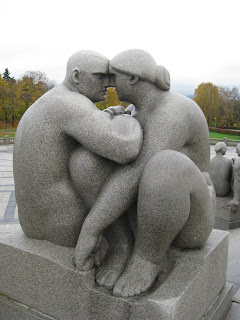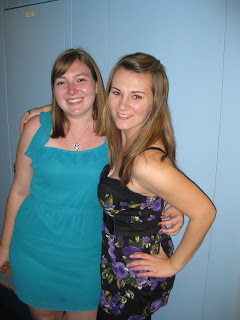I have returned from my
long study tour to England and have so much to tell you that I've decided to break up the week into two blog posts: one for my time in Totnes and one for my time in London. I will start with Totnes below!
After nearly 5 hours of travel time (by plane and train) we finally arrived in Totnes, England.
Totnes is a quaint little town located in the south-western part of England, about 3.5 hours by train from London. The first thing we did was check-in at our bed & breakfast, called the Old Forge. The B&B was adorable and really displayed the small town charm of England, tea and scones included.
 |
| delicious tea and scones |
 |
| our bed & breakfast |
After getting all settled in, we headed off to St. John's Church for dinner and an introduction to a transition town project called the Food Link. For dinner we enjoyed locally grown vegetables and grazed meat, including a quiche with fresh squash and blue cheese (my favorite). The Food Link project puts local farmers and producers in contact with retailers and businesses to make for a more sustainable food network in Totnes.
In the morning on Monday, we were introduced to the
Transition Town Totnes program as a whole. The program focuses on transitioning away from an oil dependent community. Hal, our wonderful tour guide, said that the situation peak oil has placed us in is the "greatest opportunity for economic, social, and cultural renewal we've ever had." I have to agree with Hal on this one. We can't bury our heads in the sand like ostriches and hope everything turns out fine while the world around us is going to hell in a hand basket.
We also played a cool game that demonstrated the resilience and interconnectedness of our ecosystems. Each person was given a character to play and we had to say how our character was connected to another in the ecosystem and then connect our hands with a string. For example, I was the owl and I gave my string to the oak because it gives me shelter. After a while we had a complex web of relationships among many creatures. At the end, we started removing elements of the ecosystem and watched how quickly the whole web fell apart.
 |
| Bob the Bus stop |
After lunch on our own in Totnes, we split into groups to explore some initiatives at work in the town. For example, we visited the home of a local named Joe, who takes part in the Transition Together Program, which links different households together to make smarter choices regarding energy use and saving money. The groups meet once a week with a guided book to learn about energy usage in their homes and how to reduce their impact and their bills. We also visited a community garden, Bob the Bus (the local transport system), a renewable energy office, and
Greenfibres, a company selling natural, organic textiles.
 |
| wishing tree in community garden |
 |
| overlooking Totnes |
 |
a roof built using the
hull from a ship |
The day ended with a visit to the Albert Inn, a microbrewery that brews three of their own beers (Albert Ale, Whaler, and Realeativity). We had a short tour of where the magic happens (where the beer is brewed) and enjoyed each others company for the rest of the evening. I also met some locals (typical old men that hang around pubs) who taught me how to play darts the correct way.
 |
| the Albert Inn |
 |
| guiding the way to the beer garden |
Tuesday started off with a quick walk down by the River Dart to talk about the importance of the carbon and water cycles and Totnes old role as a port town. We then headed off to
Dartmoor National Park, a region known for its granite deposits, tors (hills topped with outcrops of bedrock), bogs, and rivers. The view from the various tors was absolutely gorgeous, enough so that I didn't even mind our lecture on James Lovelock's
Gaia Theory, which basically describes how all of Earth's biological and physical processes are inextricably linked and that the Earth has evolved as a single living system.
 |
| Dartmoor National Park |
 |
| enjoying the beautiful landscape |
 |
| the River Dart with some native sheep |
Soon enough we left Dartmoor and headed for
Riverford Organic Farm, where we enjoyed another locally grown lunch in their field kitchen. Menu items included such things as: roast bell pork with apples, creamed parsnip, and cider sauce; carrots and beet root with balsamic and parsley; braised corn and spinach; butternut squash salad; The meal was super delicious and fresh, which is something I've never truly experienced anywhere else.
 |
| twisted tree at Sharpham Estate |
After lunch we went to the
Sharpham Estate, a local vineyard, for a date with nature. We discussed things that make a good first date and how to apply those principles on our date with nature. Basically, we just went our own ways and found a spot in the countryside that attracted us, where we then listened to and experienced nature like never before. We also enjoyed a campfire to boil some water for tea and cook some fresh sausages for dinner.
 |
| cows roaming at Sharpham Estate |
We concluded the evening with the launch of the Transition Companion, the newest transition town handbook by author Rob Hawkins. He discussed how the whole transition town concept is really just an experiment on a global scale. There are towns all over the world who are adopting their own version of transition towns and giving it local flair. Transition is in our bloodstream and DNA; it is what we turn to in troubling times of disaster. Totnes and other transition towns are simply getting a head start on the transitioning that will soon be necessary for everyone.
Unfortunately, that was the end to our time in Totnes, and we were all very sad to say goodbye to the little town we had come to love over the past three days. Stay tuned for an update about London soon!


 After our invigorating ascent to the top of the spire, we rewarded ourselves by going to the market and trying two new cupcake flavors from Agnes Cupcakes: mint chocolate and raspberry. Both were delicious, but apple remains my favorite. We also had some bread, dip, and cheese tasting at two of the counters, which offered us a wonderful wine cheese, which is where "Wine and Cheese Wednesdays" originated.
After our invigorating ascent to the top of the spire, we rewarded ourselves by going to the market and trying two new cupcake flavors from Agnes Cupcakes: mint chocolate and raspberry. Both were delicious, but apple remains my favorite. We also had some bread, dip, and cheese tasting at two of the counters, which offered us a wonderful wine cheese, which is where "Wine and Cheese Wednesdays" originated. 


 Then we took the bus to Vigelandsparken, one of Norway's most visited attractions. The unique sculpture park is the life work of sculptor Gustav Vigeland with more than 200 sculptures in bronze, granite, and cast iron. All of the sculptures were of naked people, which made them difficult to interpret at times. I'll just add a few here for your viewing pleasure.
Then we took the bus to Vigelandsparken, one of Norway's most visited attractions. The unique sculpture park is the life work of sculptor Gustav Vigeland with more than 200 sculptures in bronze, granite, and cast iron. All of the sculptures were of naked people, which made them difficult to interpret at times. I'll just add a few here for your viewing pleasure.












































